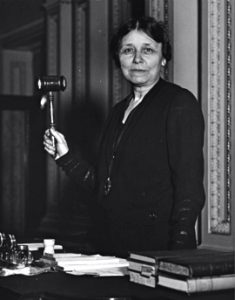First elected female U.S. senator from Jonesboro, elected 12 years after 19th Amendment
by January 18, 2018 6:09 pm 1,564 views

Thaddeus Caraway’s greatest contribution to U.S. politics and government may be linked to his untimely death. The longtime congressman and U.S. senator died abruptly Nov. 6, 1931 from a blood clot following kidney stone surgery.
One week later, then Arkansas Gov. Harvey Parnell appointed Thaddeus’ wife, Hattie Caraway, to fill her husband’s term in the U.S. Senate. A special election a few months later confirmed her position.
Her election came 12 years after the Nineteenth Amendment to the U.S. Constitution gave women the right to vote. The amendment was officially ratified Aug. 26, 1920.
Feb. 1 marks the 140th anniversary of Caraway’s birth in west central Tennessee, and November will mark 86 years since a woman was first elected to the U.S. Senate.
‘DEFIED HER OWN PARTY’
She was the first woman elected to serve in the chamber. Hattie shocked the political world a few months later when she decided to run on her own right. The colorful and controversial senator from Louisiana, Huey P. Long, aided her efforts. The first woman senator upset the political universe when she won her own six-year term. Her place in history is unique, Arkansas State University political science professor Dr. Richard Wang told Talk Business & Politics.
“It was unlike anything we’d experienced before,” he said. “She defied her own party and ran on her own. It was an historic victory.”
Her journey to the U.S. Senate wound through Tennessee, Northeast Arkansas and then finally Washington D.C. Hattie was born Feb. 1 in Bakersville, Tenn. She attended Dickson College, and there she met her future husband, a Clay County, Ark., native, according to the Encyclopedia of Arkansas.

After the couple wed in 1902, they moved to Jonesboro. He practiced law and dabbled in politics while she managed the home, including overseeing a small cotton farm. His political career began in earnest in 1912 when he was elected to the U.S. House as a Democrat. The family moved to Maryland. In 1920 he won a senate seat, and served there until his death.
Hattie was elected the same year President Franklin Roosevelt took office. She rarely spoke on the senate floor. Hattie was calculated in her words, and once said she did not want to waste taxpayer dollars to print more pages in the Congressional Record. Her name became “Silent Hattie.” The first female senator gave the president unwavering support. Wang said it’s no surprise.
“A lot of Democrats were in lockstep with Roosevelt. Nobody would blame her for that,” he said.
WINNING A SECOND TERM
By 1936, her political ally Long had been assassinated, and another aspiring politician, John L. McClellan, mounted a rigorous campaign against her. His slogan was “We need another man in the senate.” Despite his well-crafted efforts, Hattie surprised political observers again with her re-election.
Wang isn’t sure if there was anything particular about the political landscape in Arkansas that made it possible for the state to elect the first woman to the senate. Sympathy because of her husband’s death could have played a role in her first election, and maybe the electorate liked her support of Roosevelt during her second election. It’s hard to gauge why Arkansas voters opted to elect a female twice, when no other state had done so, he said.
During her time, she became the first woman to preside over the governmental body. She lobbied for a position on the Agriculture Committee because of its importance in crafting policy, and Arkansas’ top economic sector has always been agriculture. She was an advocate for the poor and oppressed, just like her husband. In one of her few senate floor speeches, she pleaded for relief and work-relief appropriations for workers.
“My philosophy of legislation, and really on life, is to be broad-minded enough to consider human relationships and the well-being of all the people as worthy of consideration, to realize that all human beings are entitled to earn, so far as possible, their daily bread, and to try to prevent the exploitation of the underprivileged,” she said.
She did break with the president on several issues. She joined fellow southern senators opposed to anti-poll tax and anti-lynching legislation. She thought both were unconstitutional. Hattie opposed the repeal of prohibition.
DEFEATED BY FULBRIGHT
In 1944, she ran for re-election, but lost to J. William Fulbright. She died five years later in 1950, and is buried next to her husband in Jonesboro. A woman wouldn’t win a U.S. Senate seat in Arkansas until 1998 when Democrat Blanche Lincoln defeated Republican Fay Boozman. Lincoln would also have a first however, being the youngest woman (age 38) elected to the Senate.
Hattie was the first female in the U.S. Senate, but since her election both houses of Congress have been dominated by men. Wang thinks that is set to change. National politicians are made at the local and state levels, he said. The number of women seeking those offices in recent years has grown, and will continue to grow into the future. He said more women have been elected governors of states in recent years.
“I celebrate it. … I hope (more females in political office) it’s happening, and continues into the future. We need it,” he said.
There are now 106 women in Congress, representing just under 20% of the 535 members (100 in the senate and 435 in the U.S. House). Of those, 79 are Democrats and 27 are Republican. Mississippi and Vermont are the only two states to have never elected a woman to the House or Senate.
